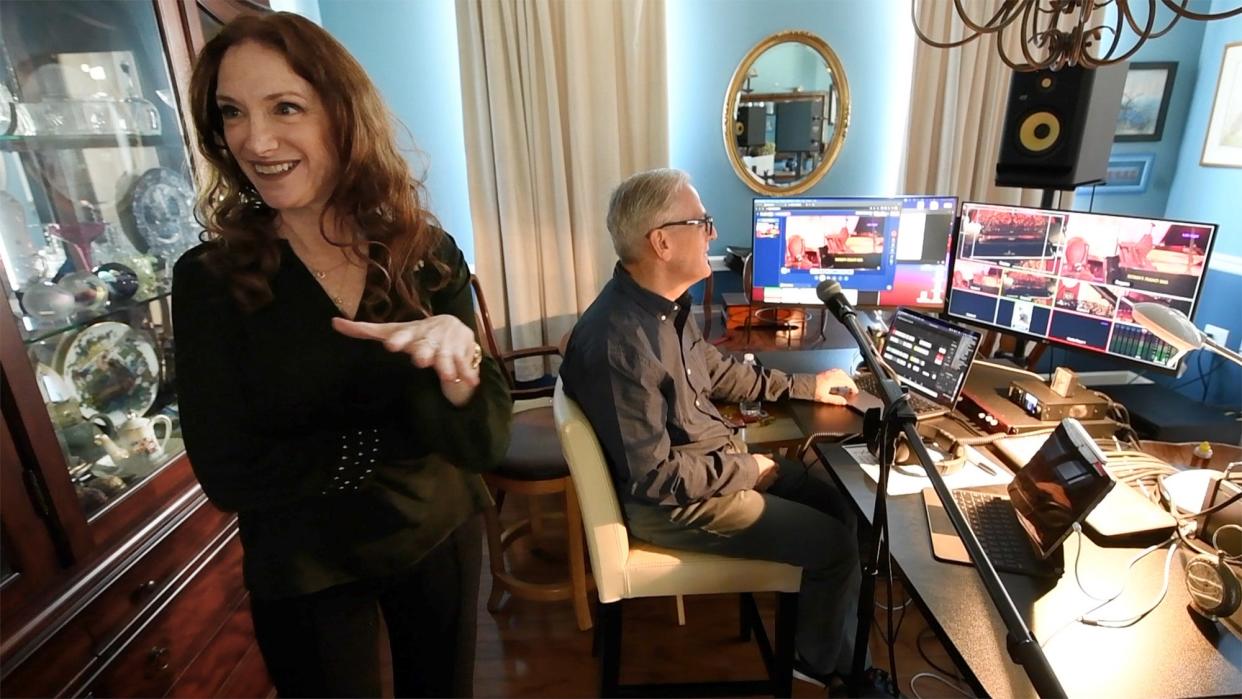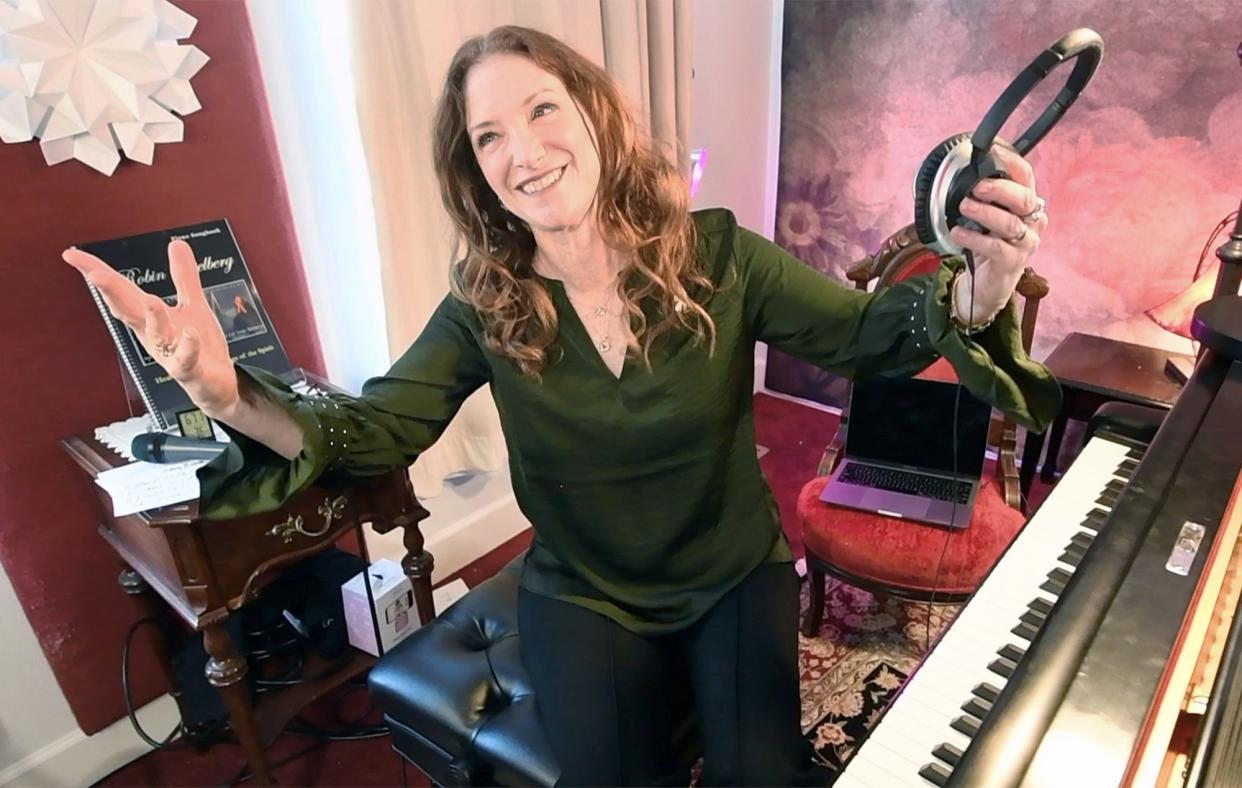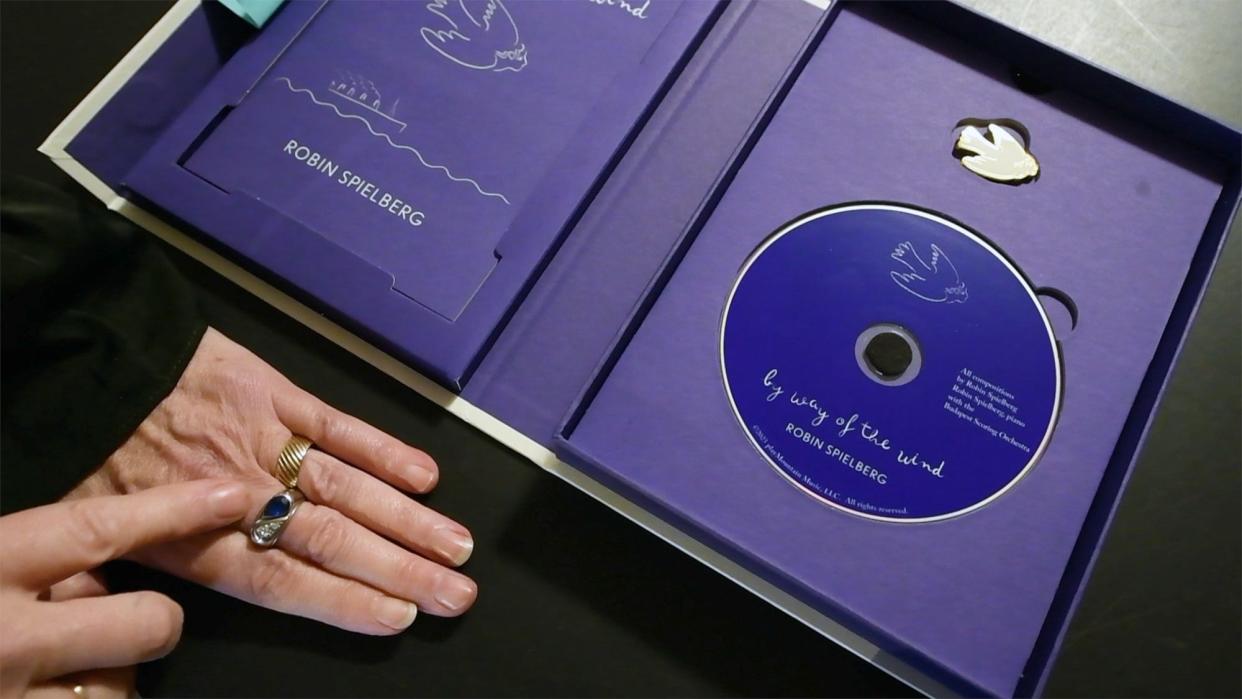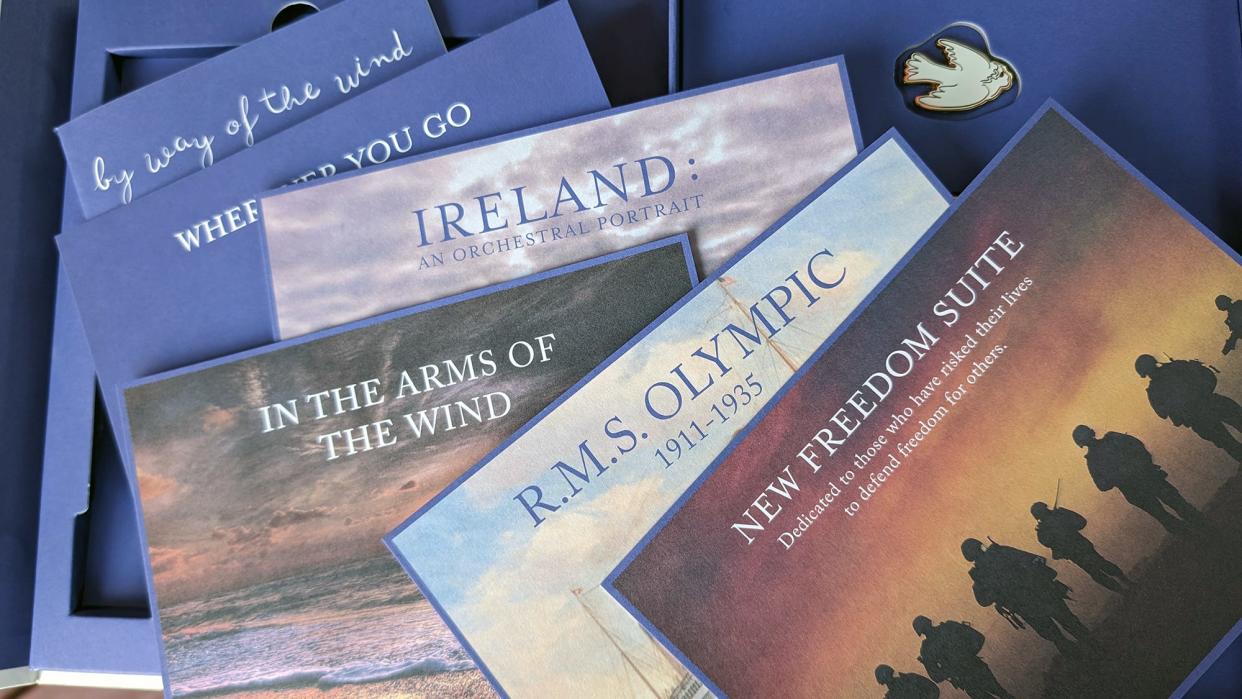York County composer's 1st symphony was born during COVID, recorded during the Ukraine war
On Feb. 7, 2020, Robin Spielberg released her 19th album, Love Story, and was preparing a 20-city tour in support of it.
She was excited about the tour. The record was a labor of love, a 15-track celebration of her love for her husband/manager Larry Kosson, featuring her solo piano arrangements of songs by Elton John, Bob Dylan, Bruce Springsteen, Crowded House and others. Her interpretations of the songs are emotive and, at times, playful, as one reviewer put it, using “the entire keyboard to deliver her message.”
The first date of the tour was in Lake Charles, La., off Interstate 10 about halfway between New Orleans and Houston, Texas.
That was on March 7, 2020.
Then COVID swept across the country and closed everything down.
The rest of the tour was scrapped as quarantines and shutdowns spread across the nation.
She returned home to New Freedom, a small town near the Maryland border in York County and began waiting for the pandemic to burn out so she could return to the road.

As she pondered what to do – no work, no income – she kept coming back to a notion that had been gestating for three decades. She had always thought about it but never had the time to scratch that creative itch.
Now she had the time.
So, she sat down and began writing a symphonic piece, framing the melodies she heard in her head with the infinite musical possibilities that an orchestra could provide.
“It’s something I’ve wanted to do forever,” Spielberg said. “Now, nothing was stopping me from working on it.”
Still, she was apprehensive.
“It was always something out of my reach,” she said, seated at her refurbished Victorian piano in her living room/studio.
Now, it was within her reach. She only had to find a way to do it.
An orchestral heritage
Robin Spielberg came to music in a kind of roundabout way. She has a musical and orchestral heritage. Her grandfather, whom she never met, was a flutist with the NBC Symphony Orchestra, as was her great uncle, a violinist. She studied drama in college and was a founding member of the Atlantic Theater Company. Two other founders were playwright/filmmaker David Mamet and actor William H. Macy.
She had played the piano since she was a child – learning to play on an old wooden, play-by-numbers organ that she still has – and was often called upon to play musical cues for the company’s productions. Eventually, she went full-time into music. In fact, the cover portrait of her first record is her acting headshot.
She’s developed into an international artist, known for her evocative solo piano work and for her work advocating for the healing power of music. She has toured the country and the world, including three sold-out performances at the Weill Recital Hall at Carnegie Hall and a tour with Hall of Fame songwriter Jimmy Webb, who wrote a number of hits recorded by Glen Campbell and others – “Wichita Lineman,” “By the Time I Get to Pheonix,” “MacArthur Park,” among others. (She was supposed to tour with Webb when her last tour was nixed by the pandemic.)
She has recorded more than 20 records and has appeared on more than 50 compilations. She has sold more than a million records and has had recordings make the Top 10 of the Billboard charts.
But she had never written an orchestral piece.

'New Freedom gave me new freedom
How she and her family wound up in New Freedom, a far cry from her hometown of Irvington, in northern New Jersey, just west of Newark and New York, is a long story.
Long story short, her daughter Valerie was born prematurely, and the medical bills were exorbitant. At the time, real estate prices in north Jersey were skyrocketing as it posed a less expensive alternative to people who commuted to New York for work.
As she and Larry researched places, they found New Freedom. Real estate prices were affordable, and it was close to Baltimore and Johns Hopkins, where her daughter’s doctor was in residence. The school district, Southern York, also had a good reputation for its programs for children with disabilities.
So, 18 years ago, they picked up and moved to New Freedom, building a home in a development on the edge of the borough. “We didn’t know anybody,” she said. “But New Freedom gave me new freedom. It turned out to be the best thing we could have done.”
And when she came to write one of her symphonic pieces, a three-part suite that evokes the sacrifices and resilience of those who have fought for our freedom, she titled it “New Freedom Suite.”

'It was a heavy lift'
After her tour was canceled, she returned home and waited for the pandemic to burn out. The days turned into weeks and then months.
“I had no work and no money and no money to record,” Robin said, sitting at the piano bench in her living room. “I had no income; it just went to zero. It was scary.”
Robin and Larry – who works as a booking agent – had to come up with something different. They went online, webcasting free concerts from their home. At first, it was a shoestring operation. But then they were able to apply for a York County Re-Start Grant, money allocated to help businesses pivot during the pandemic. Their first application was turned down. But then the county received more money and on Dec. 24, 2020, they were told they won a grant, on one condition: The money had to be spent by the end of the year.
Larry did a lot of research and ordered microphones, cameras, lights, video consoles and software. His background as a commercial photographer, shooting ads for New York agencies, helped with the lighting and camerawork. But as far as streaming video and high-quality audio, he was at a loss. “I watched a lot of YouTube videos,” he said. They have what Robin compares to a “pre-flight checklist,” that covers everything from making sure the cats are secured from the performance space and that she doesn’t have lipstick on her teeth.
The studio occupies their living and dining rooms, bisected by the foyer of their suburban-style home. A large tripod sits at the bottom of the steps, holding a camera that points into the living room, where Robin’s piano is situated. (Small pieces of blue painter’s tape mark the spots for the tripod’s feet so the camera angle remains consistent show to show.) Robin’s performance space, the large piano taking up much of the room, is in the front living room, mic’d up with four studio-grade condenser microphones. The control room is in the dining room.
It is the site of Robin’s Piano Bar, a show that she puts on at 9 every Friday night and streams over five different platforms. The concerts are free, but she does have a tip jar, asking for donations to pay her piano tuner. (The new piano strings must be tuned frequently.)

It’s created a community online. Larry, manning the control console for the hour-and-a-half-long shows, can watch as viewers chat and react to Robin’s performance.
The shows satisfied her desire to remain connected to her audience.
But she still had the notion of writing symphonic music.
All she had to do was compose it.
“It was a heavy lift,” she said.
World events get in the way, again
Writing it was a feat of imagination. “You have the music in your head, and you hear how you want it to be. You hear where the oboe comes in, where the strings come in, where the percussion, the timpani, comes in.
She worked with Louis Anthony deLise, a composer and arranger from south Jersey, near Philadelphia, who has worked with artists as varied as Patti LaBelle, Halestorm, Carlos Santana, Wynonna Judd and Kanye West.
Once the arrangements were done and the score was written, it was just a matter of finding an orchestra to record it. It was difficult. A lot of orchestras don’t want to take a chance on a first-time symphonic composer. “No orchestra is going to put out a piece by a person without a track record,” Robin said. “It’s a lot to ask.”
Robin and Larry decided to do it themselves. They found the Budapest Scoring Orchestra. If you’ve been to the movies, you’ve heard its work. The orchestra has performed scores for, well, scores of movies, including "Parasite," which won the Oscar for Best Picture in 2020, and "Get Out," Jordan Peele’s 2017 satiric horror movie.
But, once again, world events got in the way. As she planned to travel to Hungary, Russia invaded Ukraine and travel to eastern Europe was problematic.
She couldn’t record with the orchestra over Zoom because of latency, the delay in the sound that would make it impossible to synch up the parts. So, she recorded her piano parts in a studio in New Hampshire and sent them to Budapest, where the orchestra played along with them as she watched and listened over Zoom in New Freedom with deLise joining in from his studio in Cherry Hill, New Jersey.
Watching recordings of the sessions is like watching a machine. The conductor starts off the piece and the musicians play their parts flawlessly. There was one piece where there was a hiccup at the beginning, but the orchestra starts over, and it just flows.
“It was perfect,” Robin said.
More about Robin Spielberg: The pandemic forced touring musician Robin Spielberg to reinvent how she plies her trade
Previously: 'It doesn't get old': New Freedom pianist, composer releases 19th album
'One Step Closer'
The highlights of the 11-track recording – packaged in a sleek box with a hand-sewn booklet describing the inspiration of the pieces – are “A Song for Jennie” and the “New Freedom Suite.”
“A Song for Jennie” is the soundtrack of her grandmother’s journey to America from Russia in 1929 aboard the RMS Olympic, the sister ship to the Titanic. She wrote the song in 1994, composing it as she was cooking a pot of her grandmother’s chicken soup. She heard the melody in her head, went to the piano and picked out the notes. It was a strange melody that led her to compose a piece in tribute to her grandmother and her journey.
The “New Freedom Suite” began with a bugle call she composed for a production of Russian playwright Anton Chekhov’s “Three Sisters.” (She recalled that William Macy, who was directing the play, complained that the bugle player was too loud. The musician wound up playing the piece in the lady’s room on the theater’s mezzanine to give it a muted, distant sound.) That led to a three-part suite about soldiers fighting in a war. The first part, “Memories of Utopia,” is about the soldiers being called to war and anticipating fighting for their homeland. The second piece, “Soldier’s Journey” is about the warriors facing the unknown. The third movement, “One Step Closer,” is about victory and being “one step closer to that utopia where we started out.”
“We’re one step closer,” she said, describing the song, “but we may not live to see it. But we all hope we can get one step closer.”
The piece will premiere in Lake Jackson, outside of Houston, Texas, on Nov. 11, Veterans Day.
'Sometimes we face a headwind and sometimes it's at our back'
The album, “By the Way of the Wind,” born during the COVID pandemic and recorded during the war in Ukraine, was released on Oct. 20 and debuted at No. 8 on Billboard’s Classical Crossover chart.
“It’s all about the resiliency of the human spirit,” said Spielberg, a 60-year-old petite woman who appears much younger and speaks with an energy that is hard to keep up with. “It’s about how we’re influenced by unseen forces and that sometimes we face a headwind and sometimes it’s at our back.”
Columnist/reporter Mike Argento has been a York Daily Record staffer since 1982. Reach him at mike@ydr.com.
This article originally appeared on York Daily Record: COVID, Ukraine played roles in York County Pa. composer's 1st symphony
